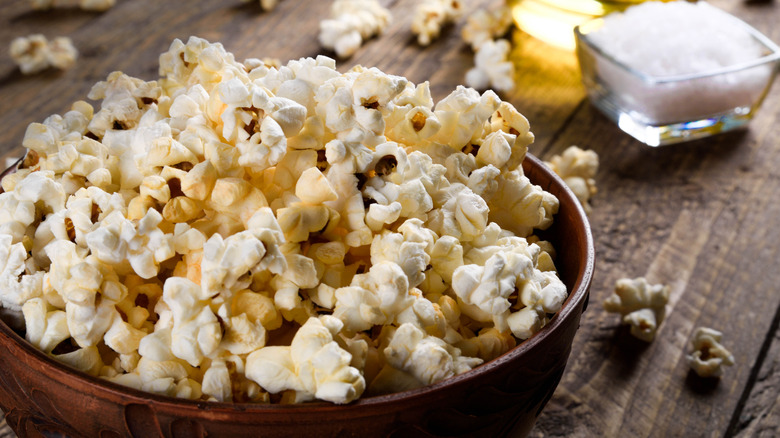Is It Safe To Eat Too Much Popcorn?
Once revered because it was fascinating to watch the kernels popping, popcorn has been a part of the American snack culture since the 1800s. Enjoyed mainly at circuses and fairs, popcorn wasn't actually welcome in movie theaters until the 1930s (per Smithsonian). While it's hard to imagine enjoying a movie without the buttery, salty tub, movie theaters, in an attempt to model themselves after actual theaters, didn't allow the snack on their red carpets until the Great Depression.
Movie theaters struggles to stay afloat by the mid-1930s, and inexpensive popcorn is credited with helping keep them open. A sugar shortage during World War II affected candy and soda production which further cemented popcorn as the most popular snack. To replicate the taste of movie theater popcorn, food manufacturers first gave Americans "EZ Pop" and "Jiffy Pop" all-in-one stovetop popcorn makers. By the 1970s, when microwaves became commonplace in kitchens, bags of microwavable popcorn made it even easier to make at home.
Today, we find popcorn at sporting and entertainment venues, in school lunches, and even in movie theater-style popcorn machines for the home. Unfortunately, most of that popcorn has excessive amounts of saturated fat and salt, according to Web MD. Movie theater popcorn ranges from 400 to 1,200 calories and has 1,500 milligrams of sodium, which equals the recommended daily amount. With nine out of 10 Americans consuming too much sodium in their diets already (per the CDC), is there a healthy way to enjoy this 100% whole grain snack?
Try air-popped popcorn
Mashed spoke with Brookell White, MS, RD, a nutrition consultant at MyFitnessPal, who says that, yes, popcorn can be a healthy snack — as long as it's unsalted and air-popped. Too much sodium can cause water retention, which leads to swelling in your extremities, weight gain, and eventually high blood pressure. The American Heart Association notes a diet high in sodium can also put you at risk for headaches, kidney disease, osteoporosis, stroke, kidney stones, and other illnesses.
White shares that popcorn contains 3.6 grams of dietary fiber, representing 15% of what people need daily and one-third of the USDA's recommended serving of whole grains for teens and adults. "Fiber is a cardioprotective nutrient because it can help to lower LDL cholesterol, blood pressure, and inflammation, all of which contribute to reducing your risk of heart disease," White says, citing 2017 research published by the National Library of Medicine.
Per the USDA, there are healthy flavor alternatives to add to your popcorn that aren't butter. While the popcorn is hot, drizzle a little olive oil and sprinkle herbs and spices such as rosemary or smoked paprika for a savory option. Add a dash of cinnamon and dark chocolate chips to satisfy a sweet tooth. Just go easy on the salt. And if you can't make popcorn at home, White suggests reaching for SkinnyPop's snack packs, which contain 100 calories per serving.

